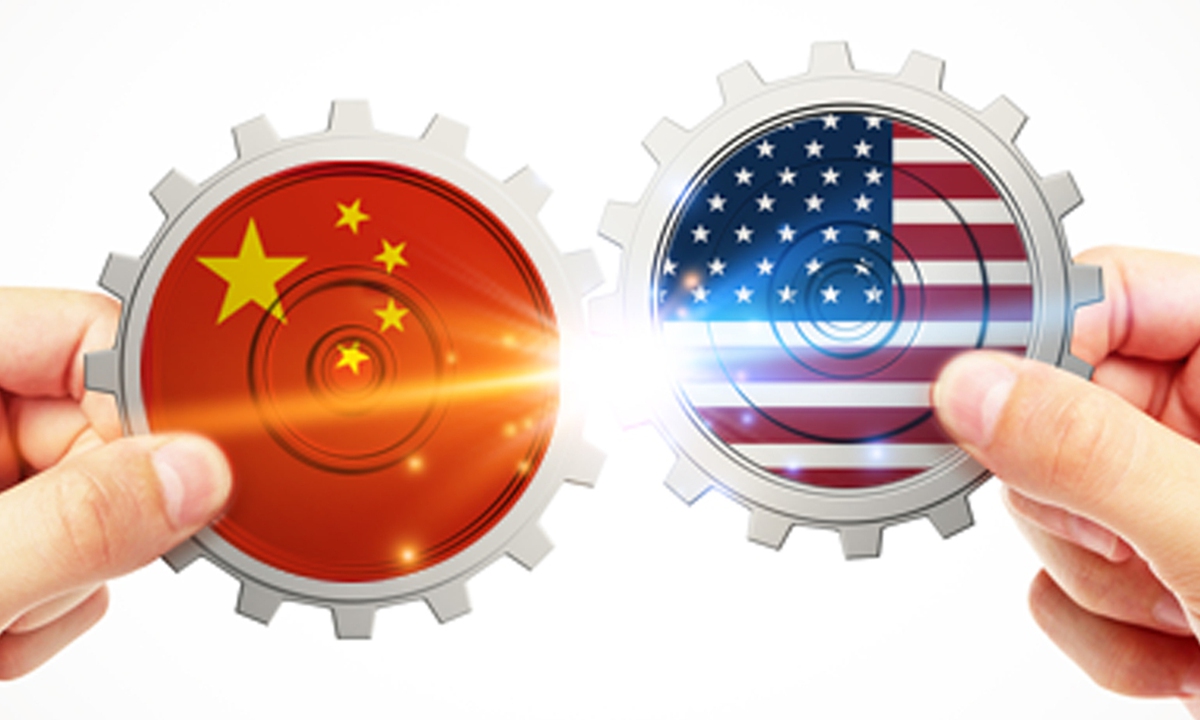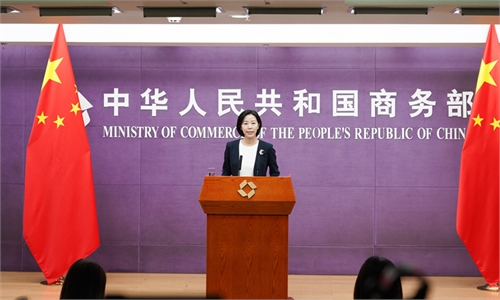Not letting disagreements prevent talks may be useful outcome of Blinken’s China visit

China-US Photo: GT
Editor's Note:
US Secretary of State Antony Blinken will pay a visit to China from June 18 to 19, both China and the US have announced. "The most useful outcome would be if the two sides can agree that they are not going to let our disagreements prevent us from communicating," Avery Goldstein (Goldstein), David M. Knott Professor of Global Politics and International Relations, Political Science Department at the University of Pennsylvania, told Global Times (GT) reporter Wang Wenwen in an interview. Professor Goldstein is in Beijing recently for scholarly exchanges. He also shared his insight of Joe Biden's China policy and the current state of China-US relations.
GT: How would you characterize the Biden administration's China policy?
Goldstein: The Biden administration's broad stance toward China continued the approach that the Trump administration took. In other words, greater concern about rivalry with China. The Biden administration did not remove the tariffs, but in fact has increased some of the restrictions on technology that can be sold to China. The difference is that unlike Trump, President Biden has focused more on diplomacy with allies, both the Europeans and allies in Asia, especially Japan and South Korea.
Also, the Biden administration is more serious about diplomacy. That's good because you want an American president to conduct foreign policy in a proper way, not in a very personal way, the way Trump did. But I do understand that in the end, it is the substance of policy that matters, and this has so far contributed to continued tensions in the relationship with China.
On Taiwan, while President Biden doesn't want to have a crisis over Taiwan, he wants to make clear to China, to the international community and the US Congress that he will not simply ignore the American relationship with Taiwan. Part of that is driven by a reaction to China's stance toward Taiwan, but part of it is also pressure from Congress to provide stronger support to Taiwan. If Biden wants to be able to work with Congress on domestic policy, he needs to make sure he doesn't get criticized too much on Taiwan.
Biden, it is true, has stated four times that the US would defend Taiwan. This is not so much something new or unknown, but to say it out loud has predictably led China to feel it has to respond in some fashion.
GT: We constantly hear voices from the US side hyping about the time frame of a war between China and the US over the Taiwan question. How likely is the risk of such a war?
Goldstein: When military people in the United States say these things, what they're trying to say is we need to be prepared for the possibility. But when you start to talk about these dates, there are two problems. One is, you have to ask, what is the basis for these claims about a particular date? Why do they pick whatever year they pick? In some cases, there really is no evidence that you can find from China's speeches or documents. The other problem is that such talk, especially within the military, can make it seem that you should expect that conflict is inevitable and this can drive a self-fulfilling prophecy. The more you talk as though conflict is inevitable, the greater the chance that it increases tensions that could trigger a conflict.
The prudent and wise thing to do is simply to monitor events to be sure that neither side is acting in ways that may bring the chance of military conflict closer.
GT: On Taiwan, to what extent will the US domestic politics jeopardize its China policy?
Goldstein: President Biden does have to make sure that he is not opening himself to the criticism that he's "too soft" on China. There are strong voices in Congress, the Gallagher committee in the House and also a handful of senators who are very strong in their outspoken support for Taiwan. The president can't tell people in Congress what to do, as was seen perhaps most clearly when house speaker Pelosi made her trip to Taiwan despite attempts to convince her no to go. Because Congress, and not just the president, has a role to play in shaping US policy, its choices can at times contribute to increased tension and limit the kinds of compromises a president might want to make in dealing with foreign countries.
GT: What is your expectation for US Secretary of State Blinken's China trip?
Goldstein: Both sides should simply say that we have important issues to discuss and although we strongly disagree on some of these issues, talking is better than not talking. Of course, such talks are not going to solve big problems any time soon. These conversations are necessary, if not sufficient, to begin trying to address problems.
Right now, the absence of once rich networks of communications between officials in the US and China is a problem. It is encouraging to see some official communications by economic actors on both sides beginning. But there have to be more high-level talks that happen on a regular basis, not just once a year or twice a year. To do this requires both China and the US to show the will to talk even when relations are not good.
Although there is not much expectation that Blinken's visit will yield major agreements, the visit could be very fruitful if the US and China are able to figure out how to re-establish more regular meetings and channels of communication going forward, and if they can agree that these channels will be kept open even if incidents take place that spark sharp criticism in each country. In short, the most useful outcome would be if the two sides can agree that they are not going to let our disagreements prevent us from communicating. At this point, such an approach would not be putting in place "guardrails." It would simply be a way to put a floor under a relationship that seems to continue sinking lower.
Now might be the last opportunity to attempt this before the 2024 presidential campaign in the US makes such outreach politically impossible until after early 2025. And in 2025, if President Biden is not reelected, a new Republican president would likely take time to determine his or her China policy and the process of rebuilding communications would have to start all over again. If Biden is reelected, it is possible, but not certain, that he would have a freer hand in crafting his China policy because he would not be concerned about his next campaign. But even so, he would need to consider how his approach to China might affect his ability to work with Congress on important legislation.
GT: Some believe China and the US are in a de facto "Cold War." What's your take?
Goldstein: It is in some ways similar to the Cold War, but in other ways, not at all like the Cold War, at least not yet.
In terms of economics, while people are talking about "decoupling" or "de-risking," this is not what happened in the Cold War. The US and the Soviet Union were already decoupled when the Cold War began. To reach that point today, after years of the US and China being closely coupled economically, would be very difficult and costly for both countries. I think that not only the United States, but major countries in Europe and Asia, including close American allies like Japan and South Korea, are not going to want to completely decouple.
The similarities compared to the Cold War are that concerns about nuclear weapons are becoming more important, and that China and the United States see each other as the world's two superpowers, both with wide-ranging interests, that are competing around the globe.
The good news is that the tense US-China relationship, even if similar to a Cold War, is not a hot war. But the bad news is that even without direct military confrontation, the relationship has become tense and increasingly dangerous. Many have begun to focus on the possibility of a crisis or military conflict and worry about what would go wrong in such situations between nuclear-armed great powers. In that sense, unfortunately, the current state of US-China relations is all too reminiscent of the Cold War.

